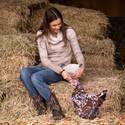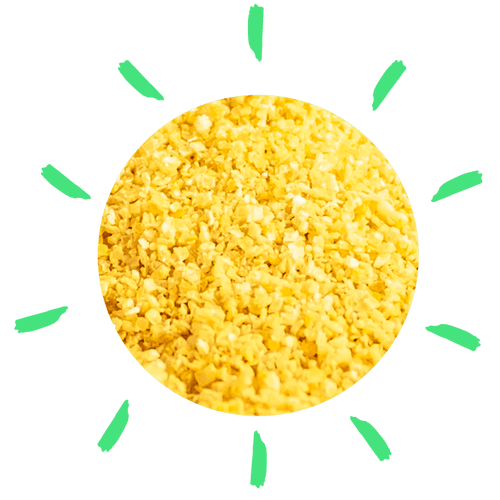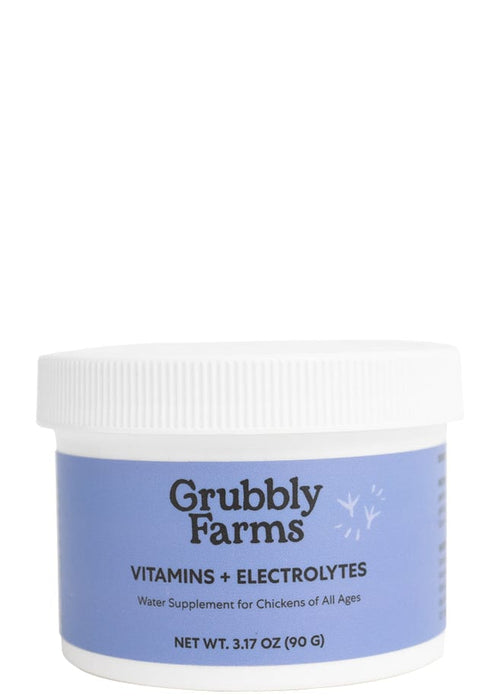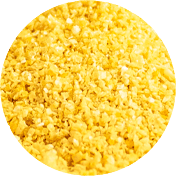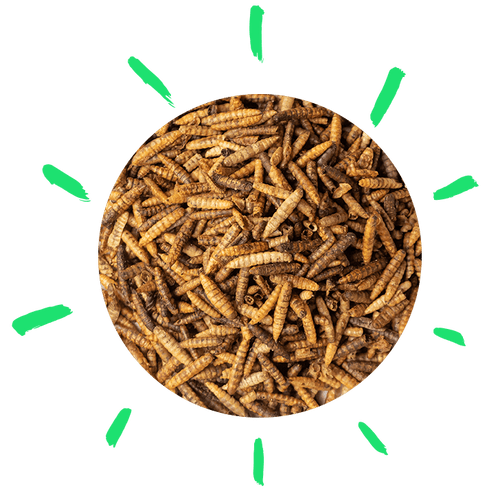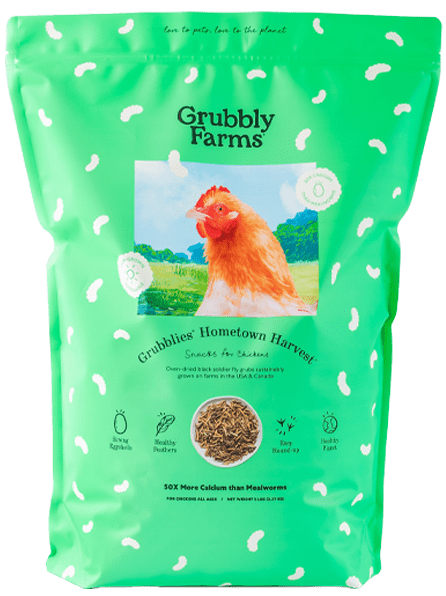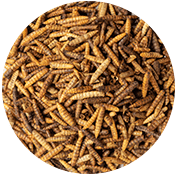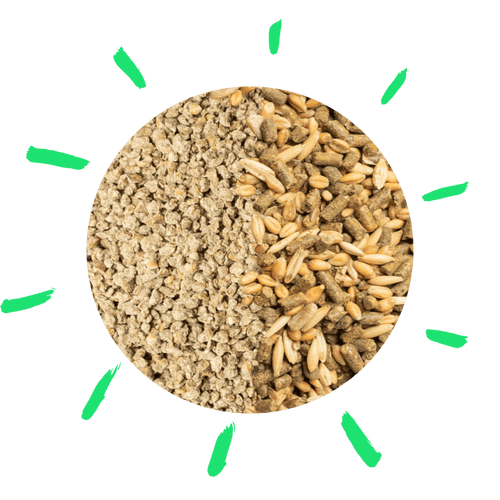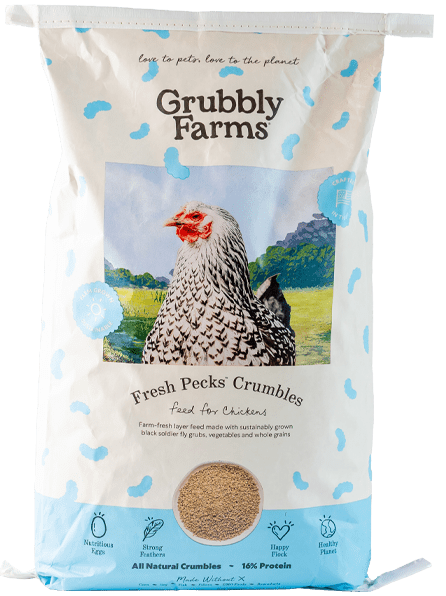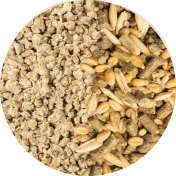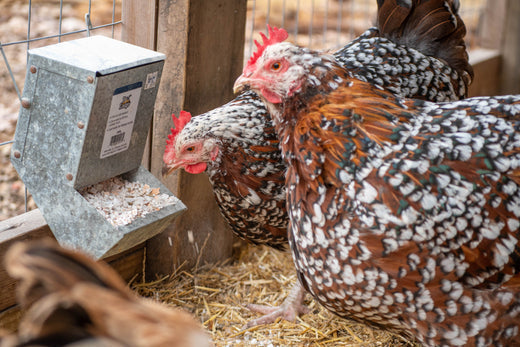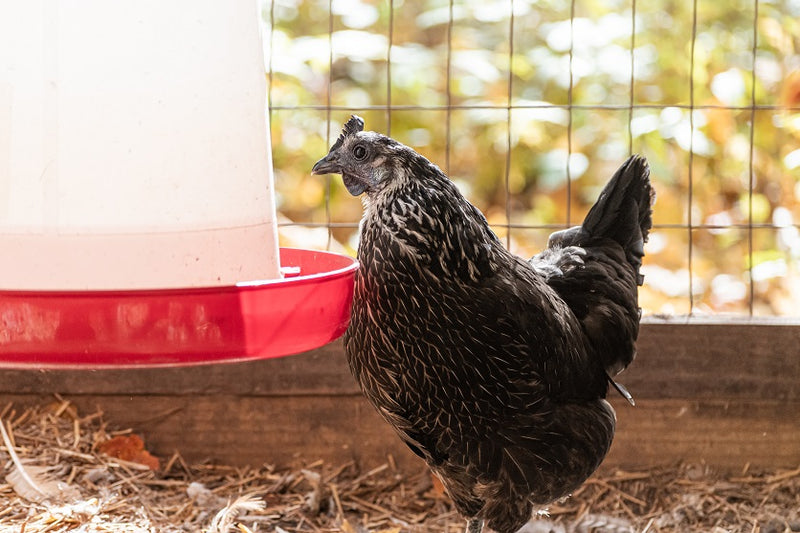Hens need vitamin D in order to form strong-shelled, nutritious eggs. Vitamin D is an essential dietary element in any bird’s daily diet, however, laying hens especially need vitamin D to prevent calcium deficiencies and reproductive issues. Breeders should also pay attention to the vitamin D in their flock’s diet since it is an important vitamin that helps breeding chickens lay eggs that will develop into healthy chicks.
Implications of Vitamin D Research in Chickens
Studies have shown that vitamin D is directly related to calcium and phosphorus in a hen’s diet (2). All three of these dietary elements rely on each other and all three are essential for healthy egg production in laying hens (4).
Vitamin D is necessary for calcium and phosphorus to be absorbed and used by the hen’s body. Adequate levels of vitamin D must be present to prevent calcium deficiencies. Since vitamin D and calcium are so reliant on each other, a deficiency in one or the other can lead to health issues, especially related to reproductive health.
Proper vitamin D levels are needed for good bone development and maintenance as well as for keeping the immune system strong (2). Vitamin D can help prevent weak bones and can help fight disease since it supports the immune system.

How Your Hens Use Calcium and Vitamin D
Calcium is an important supplement in a laying hen’s diet. While calcium plays many roles in a chicken’s body, it is one of the key nutrients needed for healthy egg production. It triggers proper hormonal responses for egg production, helps control muscle spasms when a hen is laying an egg, is necessary for strong eggshells, and is needed for the proper absorption and utilization of phosphorus.
We all know that calcium is needed by laying hens for healthy egg production functions, but what you may not realize is the important role that vitamin D plays in egg production. It is essential for the hen’s body to be able to use the calcium she consumes. Vitamin D is a fat-soluble vitamin, meaning it is dissolvable in organic solvents (not water) and metabolized by the body like fats.
When present in a chicken’s diet, vitamin D is absorbed in the small intestine and sent to the kidneys and liver to be utilized by the hen’s body (2). Vitamin D is used by the hen’s body to regulate calcium usage, and some is also passed on through the body to be contained in the eggs a hen lays. Without vitamin D, a hen would not be able to properly utilize the calcium she consumes in her diet.
The Role of Calcium in Egg Production
Vitamin D is needed for regulating calcium homeostasis. Calcium homeostasis is basically the balancing and maintaining of proper calcium levels in the body. In short, vitamin D ensures the hen’s body can use the calcium that she is consuming in her diet.
Vitamin D also aids with egg laying and eggshell formation. Proper levels of vitamin D will enable calcium to be used, stimulating healthy muscle contractions when a hen is laying an egg. Vitamin D can help prevent egg binding when proper levels of calcium are also present. When it comes to eggshell formation, vitamin D regulates the proper calcium secretion and where the calcium is sourced from for forming a healthy, strong eggshell.
Vitamin D’s Role in Calcium Absorption
Vitamin D helps the body maintain adequate serum calcium and phosphorus concentrations. It supports calcium absorption in the gut, enabling calcium from the diet to be readily used by the body for various reproductive, cardiovascular, hormonal, nervous system, digestive system, and bone maintenance functions.
Vitamin D is stored in body fat and in the liver. When it is needed to aid with absorbing calcium or phosphorus, the kidneys trigger vitamin D secretion.
Since vitamin D plays an important role in the absorption of calcium, it can also enable normal bone remineralization, proper eggshell formation, and control where calcium is drawn from in the body for those purposes. It helps the body monitor plasma calcium in the blood and can cause calcium to be drawn from the diet, the bones, or the bloodstream.
The interactions between calcium, phosphorus and vitamin D in a chicken’s diet are interrelated and all must be present for any of them to be used by the body. A deficiency in one element leads to a deficiency in the others.
Chickens and Vitamin D Deficiency
When a chicken is deficient in vitamin D, it may begin to exhibit certain symptoms. Here are some symptoms of a vitamin D deficiency in chickens:
- Penguin-like stance prior to laying an egg (weak)
- Decreased egg production
- Thin/soft shelled eggs
- Small eggs
- Calcium pimples on eggshell
- Stunted growth
- Soft beak, feet, & keel
- Poor hatchability
- Bent/malformed beak
- Bowed legs
Causes of Vitamin D Deficiency
Chickens can get vitamin D from dietary sources, or they can absorb it naturally from sunlight. When chickens are kept confined with no access to the outdoors or natural sunlight, they can develop a vitamin D deficiency. An improper or imbalanced diet can also contribute to a vitamin D deficiency.
Since vitamin D, calcium, and phosphorus are all interrelated, a deficiency in one can lead to a deficiency in another. Improper calcium or phosphorus levels in a chicken’s diet can cause a vitamin D deficiency (4).
A vitamin D deficiency will lead to poor growth in chicks and poor health in laying hens. Chicks who have a vitamin D deficiency can develop rickets and malformities. They will have stunted growth and won’t mature at a healthy rate. Laying hens with a vitamin D deficiency can also develop rickets as well as have weak bones that break easily. There will be a drop laying and possibly an increase in egg binding issues. A vitamin D deficiency in laying hens can also cause them to be deficient in calcium and phosphorus.
Nutritional Recommendations for Vitamin D
The amount of vitamin D a chicken needs in its diet is largely dependent on the ratio of calcium and phosphorus also present in the diet. The need for vitamin D increases when either of those ratios are imbalanced or inadequate.
Here are the nutritional recommendations for vitamin D in chickens of various age groups and purposes (1):
- Chicks 0-10 weeks: 3,000-4,000 IU
- Growing chicks 10-20 weeks: 2,000-3,000 IU
- Laying hens: 3,000-4,000 IU
- Breeders: 3,000-4,5000 IU
- Broilers 0-18 weeks: 3,000-4,000 IU
- Broilers 19+ weeks: 3,000-5,000 IU
Sources of Vitamin D for Chickens
There are two main sources of vitamin D for chickens: dietary sources or sunlight. Dietary sources can be in the form of natural, raw foods or vitamin supplements. Many plant-based sources of vitamin D only provide vitamin D2, which is not sufficient for meeting the vitamin D requirements of a chicken (3). Chickens need a source of vitamin D3 in order to have healthy vitamin D levels in their diet.
The main sources of vitamin D3 include cod liver oil, sunlight, or a specifically formulated vitamin supplement. Exposure to natural sunlight allows a chicken to naturally synthesize vitamin D3. The sunlight is absorbed through the skin and then the body uses other vitamins and minerals present in the diet to synthesize vitamin D.

A properly formulated vitamin supplement for poultry is another good source of vitamin D3 for chickens. Many poultry vitamin supplements are a combination of vitamins and minerals, so just make sure the vitamin supplement you get contains vitamin D3 in the ingredient list. Grubbly Farms Vitamins + Electrolytes supplement is a naturally balanced vitamin supplement that supplies vitamin D3 along with other essential vitamins and minerals.
Implementing a Balanced Diet
A balanced diet is essential for a chicken to maintain proper vitamin D levels in its body. Since vitamin D is linked to other dietary elements, like calcium and phosphorus, a proper diet is crucial for ensuring all three of those dietary elements are balanced.
The basis of a chicken’s diet should be a properly formulated chicken feed. Properly formulated chicken feed will have a balanced ratio of vitamin D, calcium, and phosphorus. Not only should the food you give your flock be balanced and wholesome, but you should also make sure it is never stale or moldy, which affects the nutritional value of the feed.
Even when a flock is fed a properly formulated chicken feed, there are still other factors that can cause their diet to become unbalanced. Giving your flock too many treats can lead to a dietary imbalance as the treats replace some of the daily feed intake a chicken should be consuming to get proper nutrition. To maintain a balanced diet, feed your flock healthy snacks on a regular basis and only feed special treats in moderation. Snacks and treats should constitute no more than 10% of your flock’s daily diet.
Environmental factors and health issues can also cause a chicken’s dietary needs to fluctuate. A change in season or extremely hot or cold weather can cause different dietary needs. Any kind of illness, injury, or infection can cause a chicken to change its eating habits and cause a change in dietary needs. Being aware of these fluctuating dietary needs can help you make sure your flock gets the nutrition they need all year round.

Practical Tips for Ensuring Adequate Vitamin D
Feeding your flock a balanced diet and making sure they have daily access to the outdoors and sunshine are great ways to prevent vitamin D deficiencies. However, you should also know what to look for when you suspect insufficient vitamin D levels in your flock’s diet.
In chicks, you will want to watch for stunted growth and growth abnormalities, like rickets, malformed bones or malformed beaks. In laying hens, you will want to watch for a decrease in laying or poor egg quality. Thin or soft-shelled eggs can indicate a dietary imbalance of vitamin D or calcium. In severe cases of vitamin D deficiency, a hen’s bone will feel soft and have a greater chance of breaking.
The best ways to address a vitamin D deficiency is by making sure your flock has more sunlight exposure and by giving them a vitamin supplement.
Sunlight Exposure- Ensure your flock has a spacious outdoor run that receives sunlight for at least part of the day. The instinctual habit of sunbathing or dust bathing also gives chickens the chance to absorb sunlight for synthesizing vitamin D. If you have the opportunity to free-range your flock, you will notice they will spend some time in the direct sunlight when they are foraging, dust bathing, or sunbathing.
Vitamin Supplement- You can also give your flock a vitamin supplement if you suspect a vitamin D deficiency. Giving a vitamin supplement when there is a sudden change in weather, illness, or during stressful situations can help prevent a vitamin deficiency from becoming a problem. Poultry vitamin supplements are often formulated to be put in your flock’s drinking water, which makes them an easy supplement to administer and ensures proper dosages.
Calcium Supplement- Since vitamin D and calcium are interrelated, your flock must also get the necessary calcium in their diet for a vitamin D deficiency to be fixed or prevented. Offer your flock a free-choice calcium supplement, like crushed oyster shells, so that the hens can consume more calcium as needed.
Can I give my chickens too much vitamin D?
Yes, there is such a thing as too much vitamin D in a hen’s diet. Since vitamin D is a fat-soluble vitamin, excess can be stored by the body instead of being expelled. Vitamin D toxicity is rare, but too much vitamin D or calcium in a hen’s diet can lead to hypercalcemia (1). Hypercalcemia is when there is too much calcium in the bloodstream, in other words, the body is absorbing too much calcium. Hypercalcemia can cause gout, heart issues, and liver damage. An early sign of too much calcium or vitamin D in the diet is the presence of pimples on a hen’s eggshells. Pimples are hard, raised calcium deposits that leave a hole or dent in the eggshell when scraped off. To resolve vitamin D toxicity, consider what dietary elements are in your flock’s daily diet that might be providing them with more vitamin D than they need. One example would be using a vitamin supplement too frequently when it is not needed.

Conclusion
Vitamin D is an essential dietary element, especially for laying hens who need it to maintain a healthy reproductive system. A chicken needs vitamin D in its diet to properly absorb and utilize calcium and phosphorus. Proper vitamin D levels in a chicken’s diet ensures proper eggshell formation, healthy bone maintenance, and strong immune system health. Make sure your flock is getting the vitamin D they need by feeding them a balanced diet and ensuring they have access to sunlight exposure every day! An occasional vitamin supplement can also help during times of stress or illness.
Sources
(1) Vitamin D deficiency in Chickens (poultrydvm.com)
(2) Centennial Review: Effects of vitamins A, D, E, and C on the chicken immune system - PMC (nih.gov)
(3) Vitamin Deficiencies in Poultry - Poultry - Merck Veterinary Manual (merckvetmanual.com)
(4) Damerow, Gail. The Chicken Health Handbook: A Complete Guide to Maximizing Flock Health & Dealing with Disease. Storey Publishing, 2015






